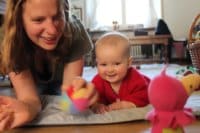![]()

In our lives with a young child there may be many challenging moments that make us feel stressed out, serious, and frustrated, getting locked in a power struggle with our kids. A lot of these occur when we want our child to do something that they don't want to do. The more we try to force the issue the more our child resists.
Hand in Hand Parenting is all about redistributing the power balance, being flexible with our kids, and then seeing their own flexibility and natural co-operation shining through.
Playlistening is what we call it, when we put ourselves in the less powerful role, to get the giggles going. Laughter releases the tension our child feels and builds connection between ourselves and our child. After a bit of laughter our child is often much more likely to co-operate with us. It's a powerful effective way to get out of a power struggle and on with the day.
Here are ten awkward moments where laughter can save the day. Repeat as necessary until the giggles (or you!) are exhausted.
#1. Getting Dressed – If you're toddler's refusing to get dressed it can leave you feeling irritated and impatient, but luckily there's plenty of fuel for giggles in the dressing process. Try putting on a ‘serious,' voice and say, ”come on now lets put these trousers on' and end up putting them on their arms. Put their socks on their hands, or their pants on their head. Put their cardigan on back to front, or their feet in the arm holes. Children absolutely love it when we make mistakes. It helps to build their confidence when they can be the competent one, telling us that we are getting it all wrong. And then they'll be sure to tell us the right way to put on their clothes, and maybe even co-operate!
#2. Brushing Hair – When my daughter refused to let me brush her hair she would instantly change her mind if a teddy or doll wanted to do it. Somehow the teddy was always much more gentle than me, and never accidentally pulled too hard. If a bit of laughter is needed try brushing your child's hair with other household objects like a spoon or a sock, and then exclaim, ”Oh dear! That's not a hairbrush, I keep getting it wrong.”
#3. Getting Out of The House – Grab a teddy or doll, and try to put your child's coat and shoes on. Take them to do the door, and say ”come on (child's name) it's time to go,” then suddenly realise your mistake, and exclaim, ‘oh dear, that's not the right person! Let me try again.”
#4. During Mealtimes – Toddler's can be fussy, and often their fears and anxieties can be projected onto food. Put yourself in the less powerful role, by being playfully afraid of your food. Pick up a fork of food, scrunch up your nose and, ”Oooh I don't know what this strange food is.” Or try picking food up with your fork, and keep dropping it by ‘mistake.' Or try feeding your ears or nose, and then exclaim with mock frustration that you keep getting it wrong. After a few giggles your toddler may forget all about being cautious and get on with the meal.
#5. If your toddler is having trouble sharing – then grab an object and say invitingly, ”this is my car/doll/toy, and I don't want anyone to take it off me.” Let your child creep up to you, grab the object and run away. Chase them but always let them win, so they are the powerful role. Repeat with another object or the same one if they put it down. This and similar games help your child to release competitive feelings and be more generous with friends.
#6. When your toddler's being clingy – Say, ”oh there's a baby stuck to me, how did she get there? ” Try to unstick yourself but always let them win. As you shower them in playful affection, they can release their clingyness with giggles.
#7. If your toddler is aggressive – then turn the tables around, and let them fight you. Playfully catch their kicks, or punches, have a pillow fight, or try some roughousing which has been shown to reduce aggression in children. Giving children an outlet for their feelings in play with you, means they don't need to bring them up with other children.
#8. When your toddler is whiny or moaning, or complaining abut being bored – Have a clothes fight! Grab some clothes, and divide family members into teams. Have one team on a bed trying to throw clothes onto the floor, and another team on the floor trying to throw the clothes onto the bed. This is a great mood shifter. Let the fun and giggles commence!
#9. Cleaning Teeth – Pretend to clean your kids ears, or nose, and keep exclaiming that you are getting it wrong. Or try to brush your kid's teeth and end up with a flying toothbrush that keeps landing in surprising places like the bath, sink, or even another room instead of your child's mouth.
#10. Bedtime – When there's still time to play in the evening, put your child into their bed, and then say invitingly, ”I hope you don't get out of bed, ” and leave the door open, as you leave. Let them run out of the room and appear. Act all surprised and then say, ”Oh dear, I better get you back to bed again.” Repeat until any excess energy or tension has disappeared, and your child is happy to go to sleep for real. Laughter induces melatonin the sleep hormone, so this is the perfect way to end the day.
I hope this list makes your day go more smoothly. Are there any other scenarios that you'd like a ‘laughter cure' for? Leave me a comment, and I'll try to think up some games!
 Kate Orson is a Hand in Hand Parenting Instructor, and mother to a 4 year old daughter. Originally from the UK she now lives in Basel, Switzerland. She is the author of Tears Heal, How To Listen To Our Children, which will be published in 2016. Connect with Kate on Facebook or follow her blog.
Kate Orson is a Hand in Hand Parenting Instructor, and mother to a 4 year old daughter. Originally from the UK she now lives in Basel, Switzerland. She is the author of Tears Heal, How To Listen To Our Children, which will be published in 2016. Connect with Kate on Facebook or follow her blog.
Join Kate in her next online parenting class.